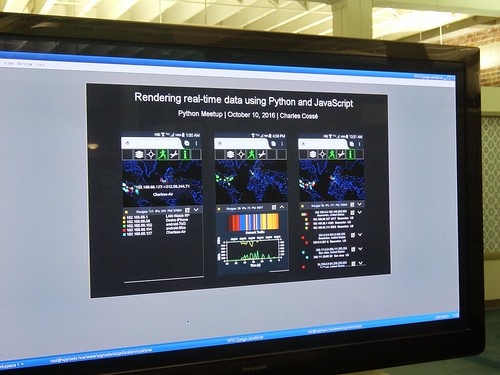Tonight was brilliant I thought, with many interesting threads, plus an excellent talk by Charles Cossé. Flying Circus is taking off.
For those new to this blog, I'm referring to a weekly meetup at PDX Code Guild, for which Neil Raja and I have been serving as co-organizers. We're not the Portland Python User Group, which meets elsewhere (we're smaller and stray from Python quite liberally).
Charles plugged his Raspberry Pi 2 Model B into the big screen monitor using the HDMI out, and shared both slides and working application, at that time about 75% complete.
He shared a generically useful pattern (see slides), which is to have Django, the Python web framework, talk to a suite of daemons (one or more), each monitoring some data source, and then sharing summary visualizations with a web client running JavaScript, talking to Django over AJAX, using JSON.
Django talks to the Python daemons over xml-rpc (remote procedure calls). The daemons might monitor IP traffic in various ways. Think of a patient's vital signs. The heart rate, oxygenation level and so on go back to d3.js, a 2D visualization library that updates a dashboard in real time.
In this particular application, the Raspberry Pi serves as a hotspot with two Wifi connections, one for random clients, e.g. the smartphones of people there, the other connected to the school's hotspot.
The Pi is acting as a wifi enabled router in other words. Since d3.js contains maps (as in Mercator Projection), the mere fact of logging in to the service registers as a dot in Portland, Oregon. Then we can watch who's hogging bandwidth, other stuff.
Electron is to Chromium as XUL is to Firefox, providing a client container capable of hosting a DOM and running client side JavaScript.
Sheri, the school's director, clued me about a free course at Oregon State in permaculture, that starts on Halloween. I signed up. I'm interested in Biosphere 2 type experiments, or just maximizing efficiencies -- ala New Alchemy Institute -- in some Bucky dome someplace. The campus is remote, so best if the fruits and vegetables are grown locally.
As has happened in some previous Flying Circus meetups, crypto-curriences, such as bitcoin, became a topic. We had some people who'd one their homework. I'm not claiming any of us were actual bitcoin miners, a technical term, but some of us knew people who are or were. Neal and I are both working in support of Measure 97.
For those new to this blog, I'm referring to a weekly meetup at PDX Code Guild, for which Neil Raja and I have been serving as co-organizers. We're not the Portland Python User Group, which meets elsewhere (we're smaller and stray from Python quite liberally).
Charles plugged his Raspberry Pi 2 Model B into the big screen monitor using the HDMI out, and shared both slides and working application, at that time about 75% complete.
He shared a generically useful pattern (see slides), which is to have Django, the Python web framework, talk to a suite of daemons (one or more), each monitoring some data source, and then sharing summary visualizations with a web client running JavaScript, talking to Django over AJAX, using JSON.
Django talks to the Python daemons over xml-rpc (remote procedure calls). The daemons might monitor IP traffic in various ways. Think of a patient's vital signs. The heart rate, oxygenation level and so on go back to d3.js, a 2D visualization library that updates a dashboard in real time.
In this particular application, the Raspberry Pi serves as a hotspot with two Wifi connections, one for random clients, e.g. the smartphones of people there, the other connected to the school's hotspot.
The Pi is acting as a wifi enabled router in other words. Since d3.js contains maps (as in Mercator Projection), the mere fact of logging in to the service registers as a dot in Portland, Oregon. Then we can watch who's hogging bandwidth, other stuff.
Electron is to Chromium as XUL is to Firefox, providing a client container capable of hosting a DOM and running client side JavaScript.
Sheri, the school's director, clued me about a free course at Oregon State in permaculture, that starts on Halloween. I signed up. I'm interested in Biosphere 2 type experiments, or just maximizing efficiencies -- ala New Alchemy Institute -- in some Bucky dome someplace. The campus is remote, so best if the fruits and vegetables are grown locally.
As has happened in some previous Flying Circus meetups, crypto-curriences, such as bitcoin, became a topic. We had some people who'd one their homework. I'm not claiming any of us were actual bitcoin miners, a technical term, but some of us knew people who are or were. Neal and I are both working in support of Measure 97.
Great Flying Circus tonight. Learned lots, from daemons in Python to d3.js to bitcoin to currency in Philippines & S. Africa. Permaculture.— Kirby Urner (@4DsolutionsPDX) October 11, 2016


